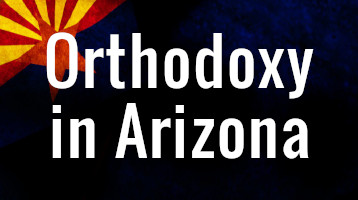
This article was included in all of our Christmas Newsletters this year.
His Beatitude Metropolitan Onuphry of Kyiv and All Ukraine, believes that the Church has entered an apocalyptic era, he said during an interview recently, and many agree with him. Commenting on the introduction of electronic passports, gradual replacement of cash, the emergence of digital identifiers, as well as the possible complete control of the state over a person, Metropolitan Onuphry noted that
“changes in the life of humanity in recent times indicate that we are entering a new historical era, which is called apocalyptic in the ecclesiastic language.”
At the same time, he says, in the future “the Church will become weaker in the number of believers, and the Church will become stronger in the quality of the spiritual life of believers.”
What does this actually mean for us? Well, I (Fr. John) am from the Midwest, and when you saw that a storm was coming, you did a few things as a matter of course, which today have become memes! We stocked up at the store, we closed up our homes, and settled in with joy and peace for the storm to pass over us. It was almost a ritual – we knew what to do, and when to have it done by. There was anticipation, but no fear.
Christ admonished us to watch the signs of the times. First of all, we have to know what it is meant by the phrase “signs of the times.” This expression comes straight from the Gospel, from the words of our Savior in Matthew 16:3. Christ tells the Pharisees and Sadducees who came to Him,
“Ye can discern the face of the sky,”
that is, tell what the weather will be;
“but can ye not discern the signs of the times?”
In other words, He’s telling them that this has nothing to do with science, or with knowing our place in the world, or anything of the sort. It’s a religious question. We study the signs of the times in order to be able to recognize Christ.
The Pharisees and Sadducees should have been watching for the inward signs. If their hearts had been right with God, and if they had not been merely trying to fulfill the outward commandment of the law, their hearts would have responded and recognized God in the flesh when He came. And many of the Jews did—the apostles, the disciples, and many others.
This same passage in the sixteenth chapter of St. Matthew speaks further about signs. Our Lord told the Jews,
“An evil and adulterous generation seeks after a sign, and there shall no sign be given unto it, but the sign of the prophet Jonah.”
The events of the Old Testament contain foreshadows of events in the New Testament. When Jonah was three days in the belly of the whale, this was a prefiguration of our Lord’s being three days in the tomb. And this sign – the sign of Jonah – was given to the people of Christ’s time.
Our Lord was telling the Pharisees and Sadducees that an evil and adulterous generation seeks for spectacular events—that is, fire coming down from heaven, or the Romans being chased away, angels manifesting themselves and banishing the foreign government of the Romans, and things of that sort. Christ told them this kind of sign would not be given. An evil and adulterous generation seeks after this, but those who are pure of heart seek rather something more spiritual. And the one sign that is given to them is the sign of Jonah. Of course, it is a great thing that a man should be three days in the grave and then rise up, being God.
Thus, from our Savior’s words, we know that we are not to watch for spectacular signs, but we are rather to look inwardly for spiritual signs. Also, we are to watch for those things, which according to Scripture must come to pass.
Our Lord gives a whole set of signs that are to come to pass before He comes again. First of all He says,
“Take heed that no man lead you astray. For many shall come in My name saying, ‘I am Christ’; and shall lead man astray.”
That is, many false Christs will come. This we’ve already seen throughout the history of the Church: those who have risen up against the Church, those who have pretended to be God, pretended to be Christ.
Secondly, in the next verse He says,
“Ye shall hear of wars and rumors of wars. Se that ye be not troubled, for these things must come to pass, but the end is not yet.”
Of course, from the very beginning of the Christian era there have been wars and rumors of wars, and even more so in our time.
“Nation shall rise against nation, and kingdom against kingdom; and there shall be famines, and pestilences, and earthquake in diverse places.”
Again, wars, then famines, earthquakes. And He says,
“All these things are the beginning of tribulation.”
Then comes the next sign, which is: persecutions.
“Then shall they deliver you up unto tribulation, and shall kill you, and ye shall be hated of all nations for My name’s sake.”
So, first we have false Christs, then wars, rumors of wars, famines, earthquakes, persecutions—and then a very important sign for our times concerning the growing cold of love:
“Because iniquity shall be multiplied, the love of many shall wax cold.”
This is the most deadly of all the signs, because the sign of Christians, as St. John the Theologian tells us, is that they have love for each other. When this love grows cold, this means that even the Christians are beginning to lose Christianity.
And what makes love grow cold faster than anything else? Fear.
Fear is not a virtue, but it has become the virtue par excellence of the modern chicken littles crying about health and care. Virtue-signaling is bad enough, but they’ve quickly turned to virtue-shaming! If you don’t do what they want, you have no love for anyone, you are a hater! You are dangerous! You can see where this is leading. Fear of the unknown. Fear of the non-existent! Fear of what may never occur. Fear – the enemy of love.
During the Nativity fast and Christmas season, our hearts are inclined away from fear and towards love; love of God, love of our fellow man, so much so that reconciliation has become a Christmas theme. We actually do fear less at this time of year, and we do love more. What power this season has ! And it has nothing to do with the ‘Spirit of Christmas’ but of the “Spirit of Christ!”
No one could have predicted what 2020 was going to be, but having endured it, and learned its lesson, let’s make a pledge to finish the year with boldness, courage, and a greater love than we ever have before.
2021 may bring some relief, or it may bring such sorrow that 2020 looks like the calm before the storm. These are external concerns, the sort of things the Pharisees and Sadducees were seeking, which is why they missed the coming of Christ. If we want to be ready – really ready – for what is coming, whatever it is, let’s prepare wisely. Let’s prepare with anticipation, but not fear – rather joy and peace, and not waste our time in vain pursuits. Let us pray fervently for each other going forward.
Let us also not fail to prepare for, and fully celebrate, the Feast! By preparing, let us leave no opportunity passing us by. Let us fast with the Church prayerfully. Let us give joyfully. Let us pray ardently , and let the words of the Holy Scriptures enrich our lives, and drip from our lips this season, so that more may encounter Christ more deeply and more surely.
Finally, while we are still able, gather for worship. The coming season and year will have their own challenges, but since we are here, now, let the House of God be full with believers, disciples who seek after Christ with their full hearts, and minds sanctified by the Word.
Brethren, should the wind turn against us, prepare. Gather your family in prayer. Meet together in love. Do the work of the Gospel. Produce the fruits of repentance, which is the theme of the Nativity fast, to prepare the way of the Lord. As the prophet Isaiah (40:3) says
“Prepare ye the Way of the Lord, make straight in the desert a highway for our God!”
Surely He is coming, and His reward is with Him! Maranatha! Come Lord Jesus!
May this Nativity be the holiest and grandest ever.
Peace be with you all.



